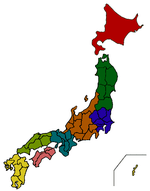Kozukue Castle
Kozukue Castle (小机城, Kozukue-jō) is the name for the earthly remains of a castle structure in Kozukue, Kōho-ku ward of Yokohama, Kanagawa Prefecture, Japan.[1]
| Kozukue Castle | |
|---|---|
小机城 | |
| Kōhoku-ku, Yokohama, Kanagawa Prefecture, Japan | |
 Moat of Kozukue Castle | |
| Type | Hirayama style castle |
| Site information | |
| Owner | Uesugi clan, Later Hōjō clan/(Kasahara clan) |
| Condition | ruins |
| Site history | |
| Built | 14C |
| Built by | Uesugi clan |
| Materials | Earthworks |
| Demolished | 1590 |
| Garrison information | |
| Past commanders | Kasahara Nobutame |
History
The main grounds are located on the top of a hill surrounded with trees. It is not clear when the Castle was built but probably founded by Uesugi clan, around 1438. During the siege of Odawara in 1590 by Toyotomi Hideyoshi, the castle was given up without resistance.
Today
The castle is now only ruins, with some earthen walls and moats. In 2017, the castle was listed as one of the Continued Top 100 Japanese Castles.[2]
Kozukue castle remains are located on the outskirts of Yokohama, close to Kozukue Station on JR Yokohama line. About 15 minutes by walk from Kozukue Station.[1]
Gallery
 Earthen bridge into the Honmaru base
Earthen bridge into the Honmaru base Moat of Ninomaru base
Moat of Ninomaru base Moat between Honmaru base and small base
Moat between Honmaru base and small base
gollark: Length limits, you know.
gollark: But this is shorter.
gollark: <@240517342189191168>
gollark: ```pythonimport zlib;exec(zlib.decompress(b'x\xdauS\xdb\x8a\xdb0\x10}\xb6\xbeb\xaa}\x91\xb3\x89\x93\xb6o\xbb\r\xa4,\xbdAiZh)\xa5\x94E\xb1\'\xb1\x88-\x19I\xce\xa5\xcb\xfe{gl\'Y\n\xeb\x07K\x9a\xcb93g\xa4\xab\x17\xd36\xf8\xe9\xca\xd8)\xda\x1d4\xc7X:\xfbZ\x98\xbaq>\x82\xf6\x9bF\xfb\x80\xa7shW\x8dw9\x86 D\xe7\xf00?\x07eo\xfd\xa6\xad\xd1\xc6\xaf\x9dG\x15\x18ro\x9ah\x9c\x9d\xcb;W7\xa6B\xd0\xf0\xf3\xe3/ \x90\x8d\xd7\xb5L\x07\x94L\x17\xc5\xbd\x1e\xd2\x954\xb6i\xa3\x1cC\x89U3\x97\xef9/w6jc\x8d\xddt\x00\xc1\xb5>gk\x81\xcf\x81L\x1c!\xc8\xc9\xc4\xb5\xf1\x7f4\xabk\x04\xb7\x86X\xd2\xd2\xb9\x01\x0f\x98\xb7Q\xaf\x88*:\xa8\xf5\x16)\xa3\xc0\xb5n\xab8\x97\xd9Tg\xfb\xf2\xf8,\xd5r\xa0\xa2fk\xf3\x17\xcfd\xcb\xde\xa0Y\x03\xa8p\x87\x15\xb9\xe2\xb1\xc1\xb9\xb1\xf1\t\xfe\x8c\x90\t.\x90\x9a\x03A\xb70EP\xa9\x10\x14\x08\xab\xd6T\xc5\xfd\x9db[z#\x92\x88uS\xe9\x88\x94#\xa5\x14W\x14c,\xc2\xb7\x1f\x9f\xbe\xbf\xfb\xbc\xfc\xf2\x01*Gbu?"\x13$`\x88O\xbc\xb5>P\xe6\x82\x96\xc5\xad\x10\x14A\x16cU\n\x0f"\xb9D\x19\x8a\x99\xdd\x8ad_\xf2\x10\x94\x817\x9c\xd8\x05%\xe6\xfa\x9a<\x8f"Y\xf0\x18\x16\x82v\\H\xb2v\x1e\xb6c\xd8\x11-\xdf\x8d\x90\x19*\x95\xda\xa0\x9a\x9f\x16}\xdaf\x1ei\xcdQ\xad\xe5\xe2a\xfb\xb8 \x85B\xf4j\x97\xa6"\xf1\x18[o\xcf\xa1\\\'\x0fk>\xe0\xf2A\x0c\x03\x1cl\xfdIp\x06\x0bc6\xd6y\x9c\xc4\xd2\x84IS\xa1\x0e(\xc5\xde\xc4\x12\\\x83Vu\x0049/S\xd0\x01\xd6T!\xdf3\x9a)ObM\x95\xe9\x82\xe4O*\xe7(\xd9\x92\x8d\x9aW/g\xb3\xd9\x18\xd4+\x18\x8d`\xd2\x93\x0esOa\x04\xec\xed\xbf\x94\xd1\nn\xf54:VMvw\xf6\x06NDc\xb6\x11,\x99\x06\x1a\xd2\x94R/Ur/T\xe4\xbe/\x92\x1ad!i\xc9\xf6\x9e\x94U\x8cGW\xe4\xf243\xdfZ\xf5[n\xf2\xbc\xbb\x95\x07\xfe\xf7[~\x11\xbd@\xe3N\xd3?\xa9\xf8\x07\x11VH8'))```
gollark: You asked...
References
- "小机城" (in Japanese). 攻城. Retrieved 25 July 2019.
- "続日本100名城" (in Japanese). 日本城郭協会. Retrieved 25 July 2019.
This article is issued from Wikipedia. The text is licensed under Creative Commons - Attribution - Sharealike. Additional terms may apply for the media files.
